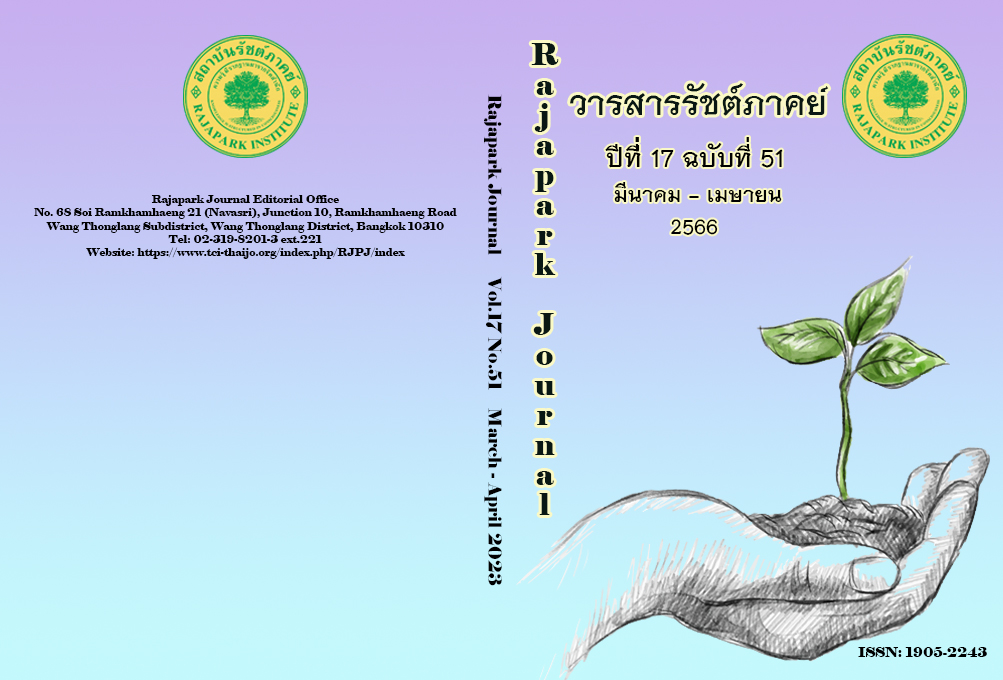Blended Learning via Social Media-based Collaborative Learning Model Using Research-based Learning to Enhance TPACK Abilities of Pre-service Teachers
Main Article Content
Abstract
The purposes of this research were: 1) to study the learning conditions and the needs; 2) to develop blended learning via social media-based collaborative learning model using research-based learning to enhance TPACK abilities of pre-service teachers; 3) to examine the effects of the model; and 4) to propose the model. The population and sample were 18 experts. The sample used in the model experiment consisted of 55 fourth-year pre-service teachers. The research instruments consisted of a questionnaire on the learning conditions and the needs, and a lesson plan. The data-gathering instruments included an evaluation form of TPACK abilities, and a questionnaire on students’ opinions. The finding revealed that the model comprised of five components: 1) blended learning environment, 2) social media-based collaborative learning tools, 3) blended learning activities, 4) roles of relevant parties, and 5) evaluation and the three main phases were: 1) prepare; and 2) join research-based learning, which consisted of five learning processes: 2.1) co-observe and identify the cause of the problem; 2.2) formulate the assumptions and consider the missions; 2.3) plan the implementation and gather the data, 2.4) discuss the processes and analyze the data; 2.5) conclude the study online and unravel the problem; and 3) evaluate. The result from using the model indicated that the TPACK abilities of students after the experiment was at a high level.
Article Details

This work is licensed under a Creative Commons Attribution-NonCommercial-NoDerivatives 4.0 International License.
Views and opinions appearing in the Journal it is the responsibility of the author of the article, and does not constitute the view and responsibility of the editorial team.
References
Al-Rahmi, W.M., Yahaya, N., Alturki, U., Alrobai, A., Aldraiweesh, A.A., Alsayed, A.O., & Kamin, Y.B. (2022). Social media-based collaborative learning: The effect on learning success with the moderating role of cyberstalking and cyberbullying, Interactive Learning
Environments, 30(8), 1434-1447. DOI: 10.1080/10494820.2020.1728342
Ansari, J.A.N., & Khan, N.A. (2020). Exploring the role of social media in collaborative learning the new domain of learning. Smart Learning Environments, 7(9), 1-16. https://doi.org/10.1186/s40561-020-00118-7
Baran, E., Canbazoglu Bilici, S., Albayrak Sari, A., & Tondeur, J. (2019). Investigating the impact of Teacher education strategies on preservice teachers' TPACK. British Journal of Educational Technology, 50(1), 357-370. DOI: 10.1111/bjet.12565
Dafrizal, J. (2019). Leveraging Social Media in Accommodating Collaborative Learning in Indonesian Islamic Higher Education. International Journal of Recent Technology and Engineering (IJRTE), 8(2S9), 151-158. DOI: 10.35940/ijrte.B1033.0982S919
Dahmash, N.B. (2020). ‘I Couldn’t Join the Session’: Benefits and Challenges of Blended Learning amid COVID-19 from EFL Students. International Journal of English Linguistics, 10(5), 221-230. DOI: 10.5539/ijel.v10n5p221
Fahrurozi, S.K., Budiyanto, C., & Roemintoyo. (2019). Pre-service Teachers perspective in developing TPACK: Literature review. Paper presented at the AIP Conference Proceedings 2194, 020024. https://doi.org/10.1063/1.5139756
Khumraksa, B., & Rakbumrung, P. (2020). Effect of Research-Based Learning Activity to Enhance Active Learning Behavior for Science Student’s Teachers. Walailak Journal of Learning Innovations, 6(1), 127-144. https://so03.tci-thaijo.org/index.php/jliwu/article /view/241795
Krejcie, R.V., & Morgan, D.W. (1970). Determining Sample Size for Research Activities. Educational and Psychological Measurement, 30(3), 607-610.
Mishra, P., & Koehler, M. J. (2006). Technological Pedagogical Content Knowledge: A Framework for Teacher Knowledge. Teachers College Record, 108(6), 1017–1054. https://doi.org/10.1111/j.1467-9620.2006.00684.x
Molinillo, S., Anaya-Sánchez, R., Aguilar-Illescas, R., & Vallespín-Arán, M. (2018). Social media-based collaborative learning: Exploring antecedents of attitude. The Internet and Higher Education, 38, 18-27. https://doi.org/10.1016/j.iheduc.2018.04.003
Nathaniel, T.I., Goodwin, R.L., Fowler, L., McPhail, B., & Black Jr., A.C. (2021). An Adaptive Blended Learning Model for the Implementation of an Integrated Medical Neuroscience Course During the Covid-19 Pandemic. Anatomical Sciences Education, 14(6), 699-710. https://doi.org/10.1002/ase.2097
Noguez, J., & Neri, L. (2019). Research-based learning: a case study for engineering students. Int J Interact Des Manuf, 13, 1283–1295. https://doi.org/10.1007/s12008-019-00570-x
Office of the Permanent Secretary, Ministry of Education. (2020). Strategy of the Ministry of Education (2020-2022). Bureau of Policy and Strategy, Office of the Permanent Secretary.
Paweenbampen, P. (2017). Research-Based Learning. CMU Journal of Education, 1(2), 62-71.
Pirozhkova, I. (2021). Higher education for sustainable development: Research-based learning (the case of the Ural State University of Economics). E3S Web Conf., 296, 08028. https://doi.org/10.1051/e3sconf/202129608028
Ratnawati, N., & Idris, I. (2020). Improving Student Capabilities through Research-Based Learning Innovation on E-Learning System. International Journal of Emerging Technologies in Learning, 15(4), 195–205. https://doi.org/10.3991/ijet.v15i04.11820
Sarıçoban, A., Tosuncuoğlu, İ., & Kırmızı, Ö. (2019). A technological pedagogical content knowledge (TPACK) assessment of preservice EFL teachers learning to teach English as a foreign language. Journal of Language and Linguistic Studies, 15(3), 1122-1137.
DOI: 10.17263/jlls.631552
Sefriani, R., Sepriana, R., Wijaya, I., Radyuli, P., & Menrisal, M. (2021). Blended learning with Edmodo: The effectiveness of statistical learning during the COVID-19 pandemic. International Journal of Evaluation and Research in Education (IJERE), 10(1), 293-299.
http://doi.org/10.11591/ijere.v10i1.20826
Tong, D.H., Uyen, B.P., & Ngan, L.K. (2021). Blended Learning for Mathematics Education During A Covid-19 Lockdown: A Case Study of Apprehending conventions for Coordinates in the Plane. SSRN. http://dx.doi.org/10.2139/ssrn.3980435
Valtonen, T., Kukkonen, J., Kontkanen, S., Mäkitalo-Siegl, K., & Sointu, E. (2018). Differences in pre-service teachers' knowledge and readiness to use ICT in education. Journal of Computer Assisted Learning, 34(2), 174-182. DOI: 10.1111/jcal.12225
USTUN, A.B., & TRACEY, M.W. (2021). An Innovative Way of Designing Blended Learning Through Design-Based Research in Higher Education. Turkish Online Journal of Distance Education, 22(2), 126-146. DOI: 10.17718/tojde.906821
Wagiono, F., Shaddiq, S., & Junaidi, F. (2022). Implementation of Blended Learning During COVID-19 Pandemic on Civic Education Subjects in Millenial Generation Era. Edunesia: Jurnal Ilmiah Pendidikan, 3(1), 36-44. https://doi.org/10.51276/edu.v3i1.213
Wongwanit, S. (2007). Needs assessment research. Bangkok: Chulalongkorn University Publishing.
Yanti, F.A., Kuswanto, H., Mundilarto., Habibi., & Rosa, F.O. (2019). Pre-Service Physics Teachers’ Research Activities by Research-Based Learning. Journal of Turkish Science Education (TUSED), 16(1), 77-84. https://doi.org/10.12973/tused.10267a
Zheng, Wei., Ma, Yu-Yu., & Lin, Hung-Lung. (2021). Research on Blended Learning in Physical Education During the COVID-19 Pandemic: A Case Study of Chinese Students. SAGE Open, 11(4). DOI: 10.1177/21582440211058196


